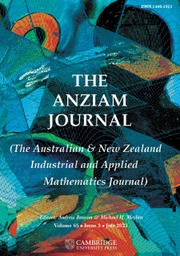Article contents
Closed form solution to some mixed boundary value problems for a charged sphere
Published online by Cambridge University Press: 17 February 2009
Abstract
A new method is described which allows an exact solution in a closed form to the following non-axisymmetric mixed boundary-value problem for a charged sphere: arbitrary potential values are given at the surface of a spherical segment while an arbitrary charge distribution is prescribed on the rest of the sphere. The method is founded on a new integral representation of the kernel of the governing integral equation. Several examples are considered. All the results are expressed in elementary functions. Some further applications of the method are discussed. No similar result seems to have been published previously.
- Type
- Research Article
- Information
- Copyright
- Copyright © Australian Mathematical Society 1987
References
- 3
- Cited by


